Poetry
About Andrew Cusack
 Writer, web designer, etc.; born in New York; educated in Argentina, Scotland, and South Africa; now based in London.
Writer, web designer, etc.; born in New York; educated in Argentina, Scotland, and South Africa; now based in London. read more
News
Blogs
Reviews & Periodicals
Arts & Design
World
France
Mitteleuropa
Knickerbockers
Argentina
The Levant
Africa
Cape of Good Hope
Netherlands
Scandinavia
Québec
India
Muscovy
Germany
Academica
Klein Gidding
Bekend nie, want nie gesoek nie
Maar gehoor, half gehoor, in die stilte
tussen twee golwe van die see.
Vinnig, nou, hier, nou, altyd –
’n Voorwaarde van volledige eenvoud
(Koste nie minder nie as alles)
En alles sal wel wees
Allerhande dinge sal wel wees
As die tonge van vlam inmekaar gevou is
In die gekroonde knoop van vuur
En die vuur en die roos is een.
Darkness
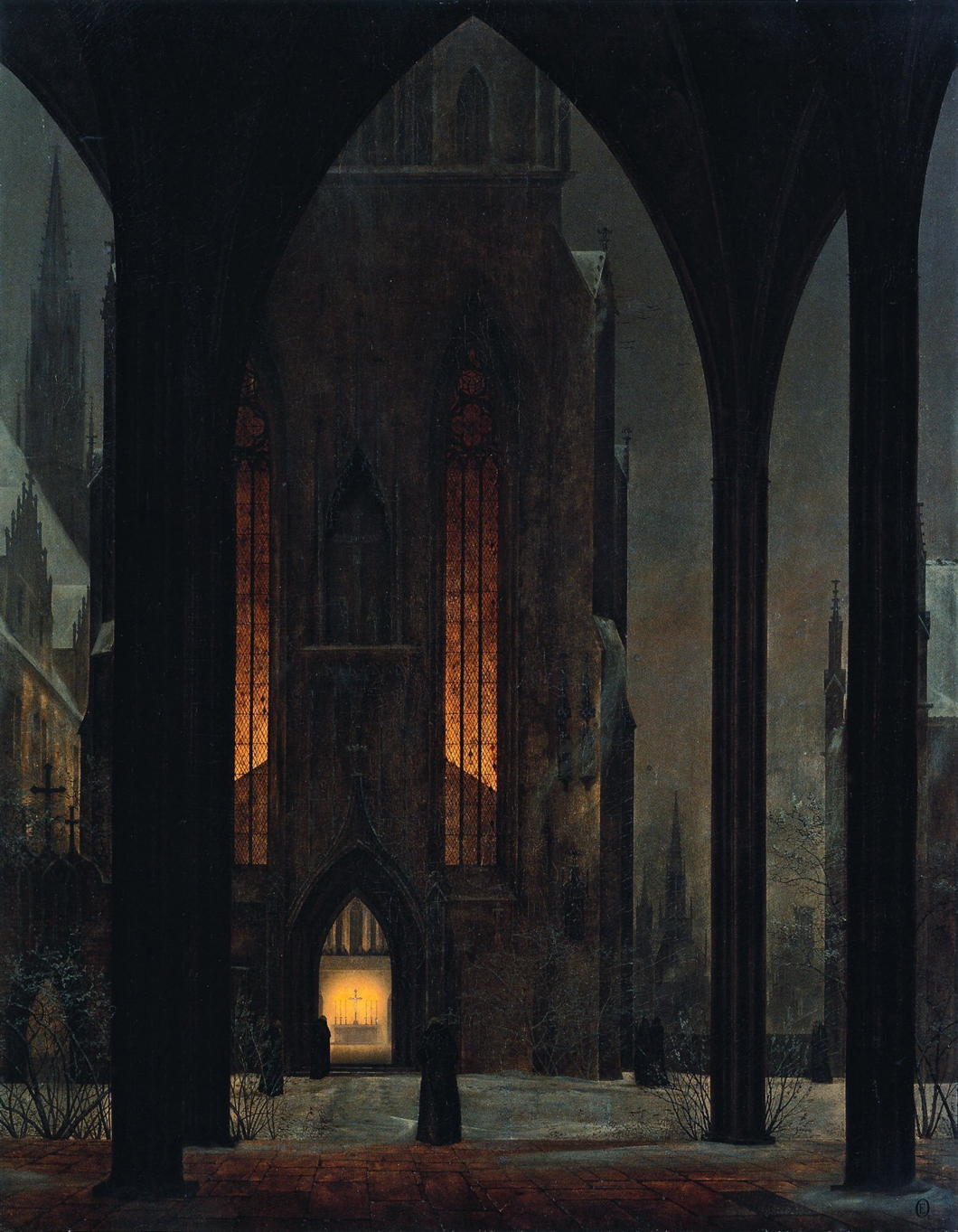
I had a dream, which was not all a dream.
The bright sun was extinguish’d, and the stars
Did wander darkling in the eternal space,
Rayless, and pathless, and the icy earth
Swung blind and blackening in the moonless air;
Morn came and went—and came, and brought no day,
And men forgot their passions in the dread
Of this their desolation; and all hearts
Were chill’d into a selfish prayer for light:
And they did live by watchfires—and the thrones,
The palaces of crowned kings—the huts,
The habitations of all things which dwell,
Were burnt for beacons; cities were consum’d,
And men were gather’d round their blazing homes
To look once more into each other’s face;
Happy were those who dwelt within the eye
Of the volcanos, and their mountain-torch:
A fearful hope was all the world contain’d;
Forests were set on fire—but hour by hour
They fell and faded—and the crackling trunks
Extinguish’d with a crash—and all was black.
The brows of men by the despairing light
Wore an unearthly aspect, as by fits
The flashes fell upon them; some lay down
And hid their eyes and wept; and some did rest
Their chins upon their clenched hands, and smil’d;
And others hurried to and fro, and fed
Their funeral piles with fuel, and look’d up
With mad disquietude on the dull sky,
The pall of a past world; and then again
With curses cast them down upon the dust,
And gnash’d their teeth and howl’d: the wild birds shriek’d
And, terrified, did flutter on the ground,
And flap their useless wings; the wildest brutes
Came tame and tremulous; and vipers crawl’d
And twin’d themselves among the multitude,
Hissing, but stingless—they were slain for food.
And War, which for a moment was no more,
Did glut himself again: a meal was bought
With blood, and each sate sullenly apart
Gorging himself in gloom: no love was left;
All earth was but one thought—and that was death
Immediate and inglorious; and the pang
Of famine fed upon all entrails—men
Died, and their bones were tombless as their flesh;
The meagre by the meagre were devour’d,
Even dogs assail’d their masters, all save one,
And he was faithful to a corse, and kept
The birds and beasts and famish’d men at bay,
Till hunger clung them, or the dropping dead
Lur’d their lank jaws; himself sought out no food,
But with a piteous and perpetual moan,
And a quick desolate cry, licking the hand
Which answer’d not with a caress—he died.
The crowd was famish’d by degrees; but two
Of an enormous city did survive,
And they were enemies: they met beside
The dying embers of an altar-place
Where had been heap’d a mass of holy things
For an unholy usage; they rak’d up,
And shivering scrap’d with their cold skeleton hands
The feeble ashes, and their feeble breath
Blew for a little life, and made a flame
Which was a mockery; then they lifted up
Their eyes as it grew lighter, and beheld
Each other’s aspects—saw, and shriek’d, and died—
Even of their mutual hideousness they died,
Unknowing who he was upon whose brow
Famine had written Fiend. The world was void,
The populous and the powerful was a lump,
Seasonless, herbless, treeless, manless, lifeless—
A lump of death—a chaos of hard clay.
The rivers, lakes and ocean all stood still,
And nothing stirr’d within their silent depths;
Ships sailorless lay rotting on the sea,
And their masts fell down piecemeal: as they dropp’d
They slept on the abyss without a surge—
The waves were dead; the tides were in their grave,
The moon, their mistress, had expir’d before;
The winds were wither’d in the stagnant air,
And the clouds perish’d; Darkness had no need
Of aid from them—She was the Universe.
This year — 2016 — will be the two-hundredth anniversary of the Year without a Summer, caused by the eruption of Mount Tambora in the Dutch East Indies the year before.
The extremely high levels of volanic material in the atmosphere led to darker skies which meant colder temperatures and failed harvests. Brown snow was reported in Hungary and red snow in Italy.
But the abnormalities in the sky were also responsible for the spectacular sunsets that inspired artists like Caspar David Friedrich and J M W Turner and the unceasing rain that provoked Mary Shelley to write Frankenstein and Lord Byron to write ‘Darkness’.
It’s no coincidence that, soon after this year of darkness, John Polidori published his book The Vampyre and the modern concept of this undead creature began to haunt the gothic imagination.
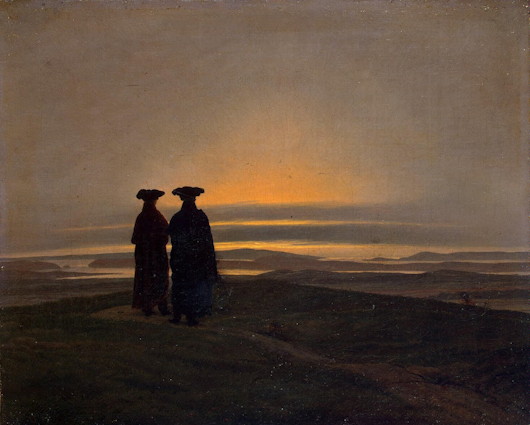
Of poets & cheese
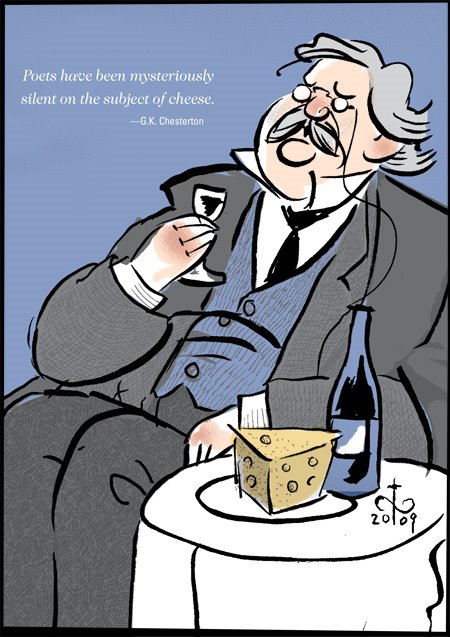
FOR G. K CHESTERTON to claim that poets have been “silent” on the subject of cheese is not quite accurate, as, while they have by no means been particularly vocal, one does occasionally stumble upon cheesely verse. I only cite one such example from The Farmer’s Boy of Robert Bloomfield (n. 1766, m. 1823).
Begins their work, begins the simple lay ;
The full-charged udder yields its willing streams,
While Mary sings some lover’s amorous dreams ;
And crouching Giles beneath a neighbouring tree
Tugs o’er his pail, and chants with equal glee.
Whose hat with tatter’d brim, of nap so bare,
From the cow’s side purloins a coat of hair,
A mottled ensign of his harmless trade,
An unambitious, peaceable cockade.
As unambitious too that cheerful aid
The mistress yields beside her rosy maid ;
With joy she views her plenteous reeking store,
And bears a brimmer to the dairy door ;
Her cows dissmiss’d, the luscious mead to roam,
Till eve again recall them loaded home,
And now the Dairy claims her choicest care,
And half her household find employment there ;
Slow rolls the churn, its load of clogging cream
At once forgoes its quality and name ;
From knotty particles first floating wide
Congealing butter’s dash’d from side to side ;
Streams of new milk through flowing coolers stray,
And snow-white curd abounds, and wholesome whey.
Due north th’ unglazed windows, cold and clear,
For warming sunbeams are unwelcome here.
Brisk goes the work beneath each busy hand,
And Giles must trudge, whoever gives command ;
A Gibeonite, that serves them all by turns ;
He drains the pump, from him the faggot burns ;
From him the noisy hogs demand their food ;
While at his heels run many a chirping brood,
Or down his path in expectation stand,
With equal claims upon his strewing hand.
Thus wastes the morn, till each with pleasure sees
The bustle o’er, and press’d the new-made cheese.
Im wunderschönen Monat Mai
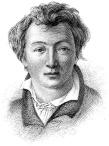
Als alle Knospen sprangen,
Da ist in meinem Herzen
Die Liebe aufgegangen.
Im wunderschönen Monat Mai,
Als alle Vögel sangen,
Da hab ich ihr gestanden
Mein Sehnen und Verlangen.
Im wunderschönen Monat Mai

Als alle Knospen sprangen,
Da ist in meinem Herzen
Die Liebe aufgegangen.
Im wunderschönen Monat Mai,
Als alle Vögel sangen,
Da hab ich ihr gestanden
Mein Sehnen und Verlangen.
This poem by Heinrich Heine (I’m sure I need not tell you) is one of my favorites, and was famously set to music by Schumann. I had intended to post it to herald the beginning of May, but distractions got the better of me, so I am afraid it must herald the month’s departure.
Attack of the Killer Poets
The gentlefolks’ aortas will gush without me.
The last chance to get stained with blood
I let go by.
Ever more often I answer ancient calls
And watch the mountains turn green.
Aeschylus fought at Marathon, Maecenas rode with Octavian, and even Coleridge had a spell in the Dragoons (under the assumed name of Silas Tomkyn Combebach), yet more recent examples of convergence between the realms of the poetical and the military leave something to be desired. The above quotation is a mere snippet from the works of Radovan Karadžić, sometime leader of the Bosnian Serb forces during the disintegration of Yugoslavia. As a Hungarian friend said recently, “If that doesn’t get him sent to the Hague, I don’t know what will!”
Misery loving company, Karadzic invited Eduard Limonov, the Russian poet, writer, and all-around nasty character, to Bosnia in the midst of the Seige of Sarajevo. This brief YouTube clip shows the two poets inspecting a Serb position overlooking the town. The tousled-haired Karadzic gloats over the woebegone metropolis while Limonov takes aim at a few civilians through the sight of a sniper rifle before opening fire. (Limonov returned to Mother Russia, where he founded the National Bolshevik, or “Nazbol” party. Is there no Russian Wodehouse to ridicule this strange band of neo-Hitlerite Stalin-worshippers? “Spagbol” seems an obvious equivalent of Roderick Spode’s Black Shorts.)
Meanwhile, we read in the feuilleton of today’s Süddeutsche Zeitung (via signandsight.com) that German authorities have refused to grant asylum to the Chechen poet Apti Bisultanov. Bisultanov, as it turns out, led a unit of thirty-five men during the Battle of Grozny and has been accused of a number of war crimes and human rights violations.
Kinda makes you wonder what nefarious plots are being hatched when David Yezzi meets Ben Downing for a drink at the Old Town.
[Cross-posted at Armavirumque]
‘To a Fishfinger’
 of our series introducing you to Peter Simple, the greatest columnist who ever was, we bring you this taste of the poetry of Julian Birdbath.
of our series introducing you to Peter Simple, the greatest columnist who ever was, we bring you this taste of the poetry of Julian Birdbath.
Birdbath is a character in the world of Peter Simple who lives at the bottom of a disused mine, alone but for his pet toad Amiel, writing poetry.
Among Birdbath’s putative translations of Esperanto verse is this delightful ode to the fishfinger – one of my favourite poems.
Thou shape impacted of Old Ocean’s heart,
With frost imbu’d and golden crumbs bedight,
Casual thy vending and thy worth too light:
How soon thy form symmetric must depart!
In rangéd boxes at the supermart
Thou bidest with thy fellows day and night,
Nor dream’st thou’ll’t scale some culinary height–
Who fries and serve thee needs no subtile art!
And yet for thee the stalwart seaman rov’d
’Mid tempests’ rage; and Iceland’s anger keen
Endur’d; nor glimpsed ’mid perils dire the end
Sublime: that thou, scorned digit, should’st be so lov’d
Dearer than pizza or th’ entinnéd bean,
For soliary men both food and friend!
edited and translated by Julian Birdbath
Drink Audit Ale in Heaven With Me
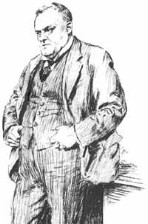
I pray good beef and I pray good beer
This holy night of all the year,
But I pray detestable drink to them
That give no honour to Bethlehem.
May all good fellows that here agree
Drink Audit Ale in heaven with me,
And may all my enemies go to hell!
Noel! Noel! Noel! Noel!
May all my enemies go to hell!
Noel! Noel!
WITH THESE SIMPLE and lovely lines, the great Hilaire Belloc superbly expressed the esprit de Noël of the Christian curmudgeon. It amounts, more or less, to “Rend honor to the Holy Child, and to hell with the rest”. His Lines for a Christmas Card are obviously meant in a jovial and light-hearted spirit (naturally, we Catholics would not wish Hell on any poor soul), and completely intelligible but for this curious line, “May all good fellows that here agree / Drink Audit Ale in heaven with me”. What on earth is Audit Ale?
Before the Reformation, the English year was a calendar of feasts, festivals, and holidays—holy days, even. Four of these holy days, spaced fairly evenly throughout the year, were marked for such things as the collection of rents and the paying of feudal tributes. These four were Lady Day (March 25, the Feast of the Annunciation), Midsummer Day (June 24, the Feast of St. John the Baptist), Michaelmas (September 29, the Feast of St. Michael the Archangel), and Christmas (December 25, of course, the Feast of the Nativity of Christ).
Now, events such as the collection of fees and taxes and the giving of feudal tribute tend towards the dour, and so often a feudal lord would have a special ale brewed for these occasions, to ensure a certain amount of merriment among the commonfolk once their tribute had been paid and the burden lifted. This tended to be called ‘audit ale’, since it was brewed around the time of audit. They were not, you will be happy to learn, the only seasonal brews around. There was ‘leet-ale’ for when the manorial court, or court-leet, convened, and there was Whitsun-ale for Whitsuntide, and there were church-ales which went towards the upkeep of the parish church and alms for the poor. Indeed, in village of Sygate in Norfolk, there is an inscription on the gallery of the church which reads:
And give us good ale enow . . .
Be merry and glade,
With good ale was this work made.
Also, interestingly, the very word ‘bridal’ comes not from the -al suffix English developed up from Latin, but rather from the Old English brýd-ealo: bride-ale or wedding-ale.
With the advent of Protestantism—and most especially the Puritan variant thereof—feasts, seasons, and other joviality generally became frowned-upon. England was forced to be less English, as the monotonous bores took over. Still, remnants of the feasts and seasons remained. Lady Day was the first day of the year in the British Empire until 1752, when the Gregorian calendar was finally adopted. Similarly, the fiscal year in the United Kingdom begins on April 6, because that day in the Gregorian calendar corresponds to Lady Day in the old Julian calendar. In Oxford and Cambridge, meanwhile, colleges still brewed special ales for the time when grades were released; either to celebrate the achievement or to soften the blow. These brews kept the old moniker of ‘audit ales’ and Belloc most likely uses the term in this derivation. Even in my own time at St Andrews we often sipped home-brewed ale from ancient, battered pewter tankards, though we rarely needed the excuse of holy days to continue the tradition.
 So this Yuletide perhaps you will consider home-brewing, and brew a special ale for the festal season now that the penetential time of Advent is passing. But, if you’re otherwise engaged, head into town and make sure to have a beer, and raise your pint to that Wondrous Babe whose birth brings us such mirth and cheer.
So this Yuletide perhaps you will consider home-brewing, and brew a special ale for the festal season now that the penetential time of Advent is passing. But, if you’re otherwise engaged, head into town and make sure to have a beer, and raise your pint to that Wondrous Babe whose birth brings us such mirth and cheer.
Christmas Eve 1886
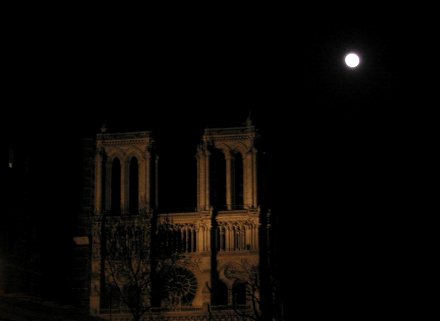
It was on this evening in 1886 that two souls experienced a profound conversion. Thérèse Martin, or Thérèse of Lisieux as she is now known, wrote of it in her spiritual biography, recounting: “On that luminous night, Our Lord accomplished in an instant the work I had not been able to do during years.”
At the same time, almost the same hour, a young man in his twenties, Paul Claudel stood in the Cathedral of Notre-Dame de Paris and began his return to the church. He was later to become a diplomat, poet, writer, and exegist.
Well I could go on further about both, but Philip Zaleski describes the conversion of Thérèse in his recent article ‘The Love of Saint Thérèse’ in First Things whereas Paul Claudel’s conversion is described by Eric Ormsby on the first page of the Arts section in today’s New York Sun. So do some research yourself. There’s a vast kingdom out there waiting to be learnt.
A very happy and blessed Christmas to you all!
Search
Instagram: @andcusack
Click here for my Instagram photos.Most Recent Posts
- Articles of Note: 11 November 2024 November 11, 2024
- Why do you read? November 5, 2024
- India November 4, 2024
- The Lithe Efficiency of the Old Constitution November 4, 2024
- Waarburg October 2, 2024
Most Recent Comments
Book Wishlist
Monthly Archives
Categories


